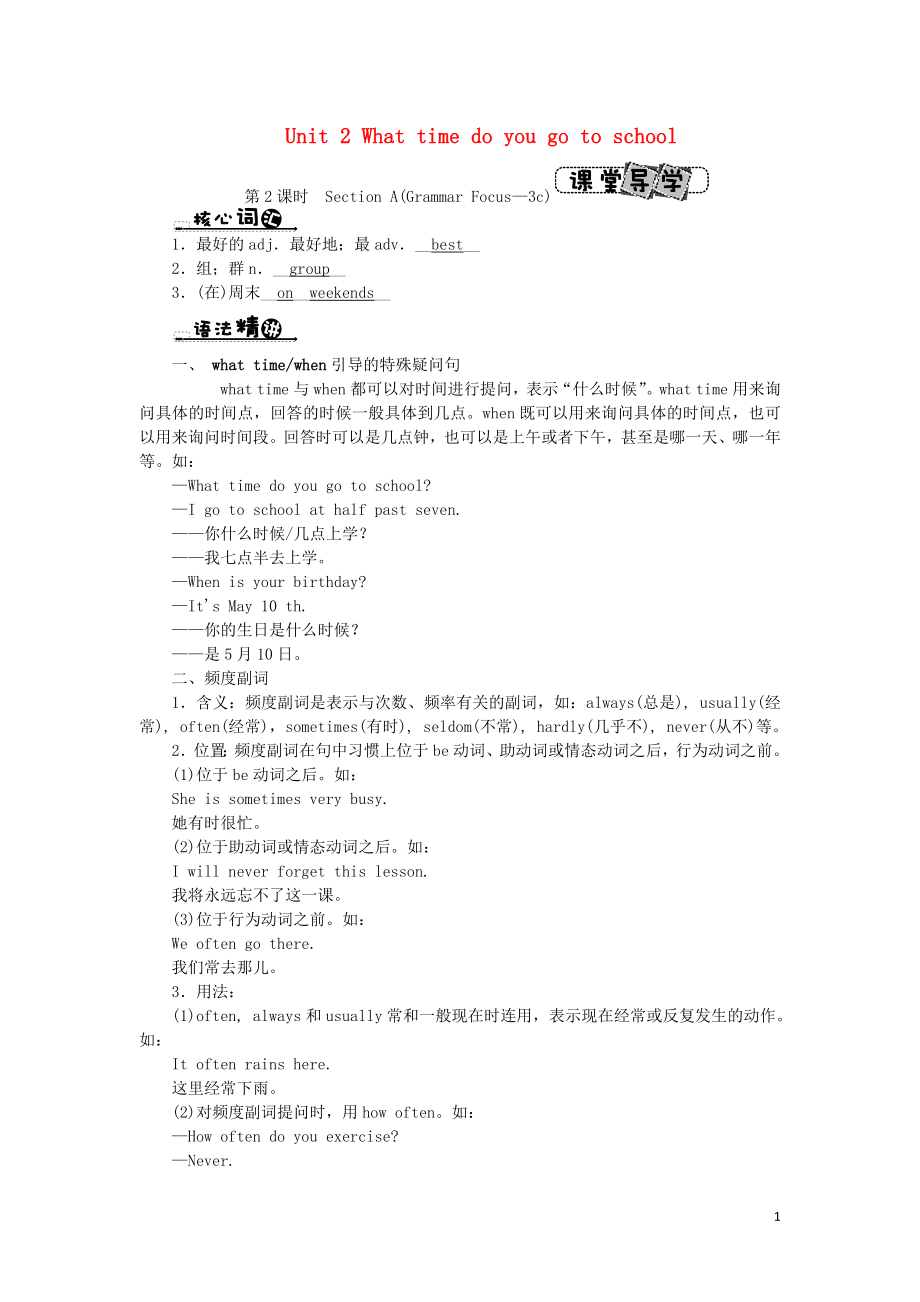《2019年春七年級英語下冊 Unit 2 What time do you go to school(第2課時)Section A(Grammar Focus-3c)課堂練習 (新版)人教新目標版》由會員分享�,可在線閱讀�,更多相關《2019年春七年級英語下冊 Unit 2 What time do you go to school(第2課時)Section A(Grammar Focus-3c)課堂練習 (新版)人教新目標版(3頁珍藏版)》請在裝配圖網(wǎng)上搜索。
1�、Unit 2 What time do you go to school
第2課時 Section A(Grammar Focus—3c)
1.最好的adj.最好地�;最adv.__best__
2.組;群n.__group__
3.(在)周末__on__weekends__
一�、 what time/when引導的特殊疑問句
what time與when都可以對時間進行提問,表示“什么時候”�。what time用來詢問具體的時間點,回答的時候一般具體到幾點�。when既可以用來詢問具體的時間點�,也可以用來詢問時間段?;卮饡r可以是幾點鐘,也可以是上午或者下午�,甚至是哪一天
2、�、哪一年等�。如:
—What time do you go to school?
—I go to school at half past seven.
——你什么時候/幾點上學�?
——我七點半去上學�。
—When is your birthday?
—It's May 10 th.
——你的生日是什么時候�?
——是5月10日�。
二�、頻度副詞
1.含義:頻度副詞是表示與次數(shù)�、頻率有關的副詞�,如:always(總是), usually(經(jīng)常), often(經(jīng)常)�,sometimes(有時), seldom(不常), hardly(幾乎不), never(從不)等�。
2.位
3、置:頻度副詞在句中習慣上位于be動詞�、助動詞或情態(tài)動詞之后,行為動詞之前�。
(1)位于be動詞之后�。如:
She is sometimes very busy.
她有時很忙�。
(2)位于助動詞或情態(tài)動詞之后�。如:
I will never forget this lesson.
我將永遠忘不了這一課�。
(3)位于行為動詞之前。如:
We often go there.
我們常去那兒�。
3.用法:
(1)often, always和usually常和一般現(xiàn)在時連用�,表示現(xiàn)在經(jīng)?;蚍磸桶l(fā)生的動作�。如:
It often rains here.
這里經(jīng)常下雨�。
(2)對頻
4�、度副詞提問時�,用how often�。如:
—How often do you exercise?
—Never.
——你多久鍛煉一次�?
——從不鍛煉�。
Ⅰ.單項選擇�。
(A)1.—________ does your sister go to swim?
—After school.
A.When B.What
C.Why D.Where
(B)2.—________ is Women's Day?
—It's March 8th.
A.What B.When
C.What time D.How often
(D)3.—________ do you pla
5�、y computer games?
—Sometimes.
A.When B.What time
C.How many D.How often
(C)4.—Do you ________ walk to school?
—No, ________.I live too far away.
A.a(chǎn)lways; usually
B.usually; often
C.often; never
D.never; often
(D)5.—________ does Lily have lunch at school?
—At twelve o'clock.
A.Wha
6�、t
B.How
C.How much
D.What time
Ⅱ.根據(jù)漢語意思完成句子�,每空一詞�。
1.——你最好的朋友里克幾點吃早飯�?
——他七點十分吃早飯。
—What time does your best friend Rick __eat/have__ __breakfast__�?
—He eats/has breakfast at __ten__ __past__ __seven__.
2.——你的朋友們什么時候鍛煉?
——他們通常在周末鍛煉�。
—__When__ do your friends exercise?
—They usually exe
7、rcise __on__ __weekends__.
3.我媽媽總是很早起床�。
My mother always __gets__ __up__ early.
4.琳達從不在晚上看電視。
Linda never __watches__ __TV__ in the evening.
5.你每天幾點睡覺?
What time do you __go__ __to__ __bed__ every day?
Ⅲ.選詞填空�。
閱讀短文,從方框中選擇適當?shù)脑~并用其正確形式填空�,使短文通順、意思完整�。每詞限用一次。
sometimes but with what fruit
exer
8�、cise go work good tidy
Hi! I'm Tony.I love weekends! I always get up late on weekends.For breakfast, I only have __1__.It's usually an apple.I have a big lunch.After lunch, I like to eat ice-cream.It tastes __2__.In the afternoon, I like to__3__.I usually play basketball.__4__ I swim.In the evening
9、, I clean the house—I like __5__ rooms, I always go to bed late, at about 23:00.
__6__ my sister doesn't like weekends.She has a job in a big store and she always __7__ on weekends.She never goes out __8__ her friends.She usually gets home from work at 22:00.After taking a shower, she __9__ to bed.
10�、Sometimes she reads in bed.But don't ask her __10__ she reads.She always sleeps after reading one or two pages(頁).
1.__fruit__ 2.__good__ 3.__exercise__
4.__Sometimes__ 5.__tidy__ 6.__But__
7.__works__ 8.__with__ 9.__goes__
10.__what__
Ⅳ.任務型閱讀。
On weekdays, Jim usually gets up
11�、at 6:30.He eats breakfast at 7:00 and then goes to school.He usually goes to school by bike.He gets to school at about 7:30 every day.He doesn't like to be late.Classes start at 8:00.
He eats lunch at noon.In the afternoon, classes are over(結(jié)束) at 3:30, and he gets home at about 4:00.But sometimes
12、he doesn't leave school so early because he plays basketball there.Then he gets home at 5:40.He eats dinner at about 6:00.
In the evening he does his homework first.He often watches TV, but sometimes he likes to do some reading.He goes to bed at about ten.
根據(jù)短文內(nèi)容�,回答下列問題。
1.What time does Jim get
13�、up on weekdays?
__At__6:30.__
2.What time are classes over in the afternoon?
__At__3:30.__
3.Does Jim leave school at 3:30 every day?
__No,__he__doesn't.__
4.What does Jim do first in the evening?
__He__does__his__homework.__
5.What does Jim usually do at ten in the evening?
__He__goes__to__bed.__
3
 2019年春七年級英語下冊 Unit 2 What time do you go to school(第2課時)Section A(Grammar Focus-3c)課堂練習 (新版)人教新目標版
2019年春七年級英語下冊 Unit 2 What time do you go to school(第2課時)Section A(Grammar Focus-3c)課堂練習 (新版)人教新目標版

